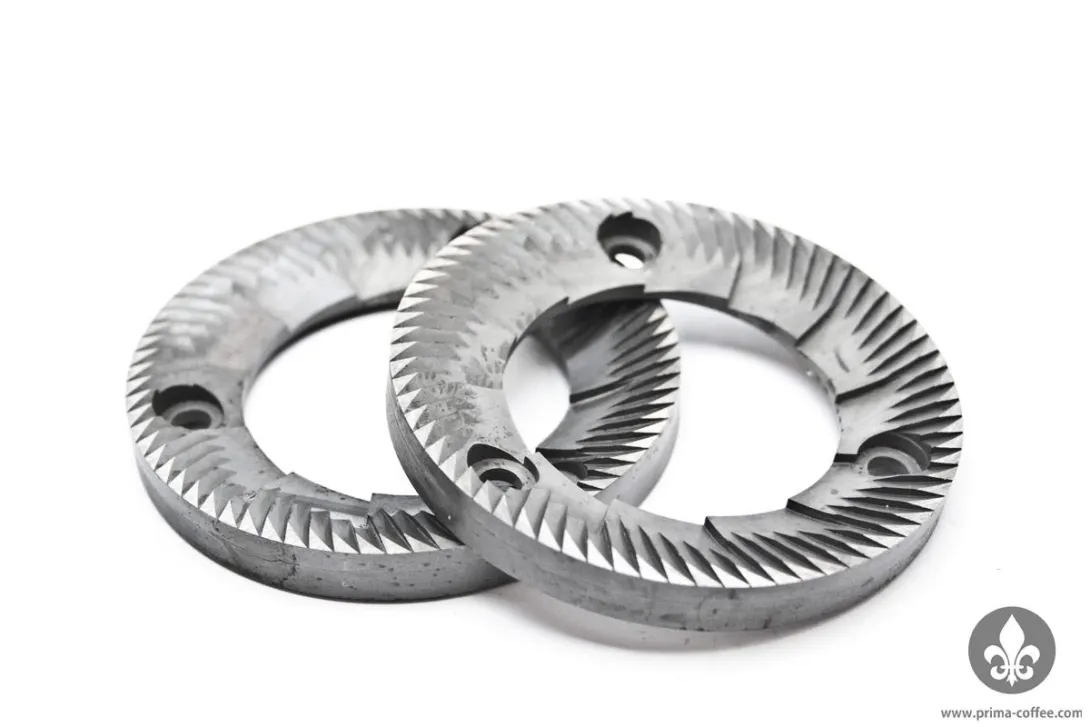
I have a high end, commercial coffee grinder with metal burrs (Mazzer Major). It's made to grind very, very fine for espresso and powerful enough to run all day long in a busy coffee shop. Mine is quite old (it's one of the first Italian machines brought to San Francisco in the early days of espresso) and will probably still be running 100 years from now. Anyway, for espresso you need very sharp burrs as you are shooting for consistent particle size (you want it to carve the coffee rather than crush it to powder) and the burrs were pretty old and getting dull when I bought mine used, so I ordered a new set of burrs (they recommend new burrs every 1,300 pounds of coffee ground).
Just for fun, before I installed the new burrs, I ground some wheat and it very quickly produced a very fine flour. (and this was with the old, dull burrs)
These days I'm starting to think about retiring my old Magic Mill III Impact mill and get something like a Mockmill or perhaps a stone or ceramic burr mill. But then I wonder if I might ought to just use the big coffee grinder I already have (it's overkill for the one espresso per day I make - and I have a smaller coffee grinder that is more than adequate for espresso).
There are a lot more teeth on the burrs than I see on grain mills with steel burrs. The burrs are 83mm. And the RPMs are surely higher than a grain mill (I think it's about 1200-1500 rpm) - but when I tested it (years ago) it produced a nice feeling, fine flour and it wasn't too warm.
What are the drawbacks to using this and the pros of spending the money for a purposebuilt grain mill? (please disregard any concern about devaluing the coffee grinder - it is ancient and cost much less than any grain mill would cost - even though a brand new coffee grinder of same model is very expensive - It's way overkill and I only bought it because it was inexpensive being so old).
Hey Mr. De Niro. — Doesn’t Andy Panda look like Robert De Niro?
I know nothing about the grinder. But if flour heating is ever an issue you could store a small amount of grain in the freezer and grind it cold. I do this all the time.
I don’t see a reason that grinder wouldn’t be great. And a nice conversation piece at that. It sounds like a beast.
Dan
As DanAyo entioned, heating the flour may be a problem but I freeze my grain prior to using my Nutrimill for that same issue. Otherwise, I'd get flour at 130F for a full hopper 8 cups) of wheat berries.
AndyPanda, do you still have the manual to your Magic Mill III? I just acquired a used one without a manual and I can't find one anywhere online.
I sure could use some help.
Thanks!!
I don't have (or can't find) my manual. But here is a Magic Mill II manual I found online. Not much difference.
Coffee grinders are designed to do very small batches......1-2 oz. of beans at a crack, tops. The directions that came with our very nice quality burr coffee mill (Baratza Maestro) specifically enjoin against grinding continuously for more than a few minutes without allowing the machine too cool off a while. My conclusion would be that milling grain in a coffee mill -even a pound of specialty grains- is just asking to burn out a perfectly good coffee mill for no good reason. I mill all my grain in a very inexpensive Corona-type mill, bought off eBay for less than $25 delivered. To take out the hand labor, I just adapted an electric drill to it with a $ 0.25 hardware store bolt.
Yes, it's true that a small home type grinder like a Baratza Maestro is only meant for a few oz at a time. But there are coffee grinders (just as there are wheat grinders) meant to run in a commercial environment. The grinder I originally posted about is one of those heavy duty, commercial coffee grinders as I said in the original post. It's certainly overkill for my needs - I grind about 12 grams of coffee each morning for my small cuppa - but I got it cheap in need of some repair that I knew how to do.
When I first got into coffee, I thought the shift from a $12 whirlyblade grinder to a $100-300 burr grinder was really "high end" stuff but there is a community of "coffee geeks" who spend $5-10,000 on a coffee grinder and most of them insist that the grinder is the most important piece of equipment in the process of making world class coffee. The reason being that when you have multiple sized particles of coffee (like you get with a whirlyblade) the fine particles extract much faster when hit with hot water than the larger particles do -- and the "ideal" coffee flavor is when all the particles of coffee are same size and extract at the same rate (the water temp is measured to a fraction of a degree and the immersion time measured to the second). The coffee geek community can really geek out on the details similar to how sourdough geeks can get very technical about every detail of bread making.
I've long since bought a MockMill for my wheat grinding needs so the original question I posted really isn't anything I'm considering --- though that grinder I was asking about in the first post is MUCH more robust than the MockMill.